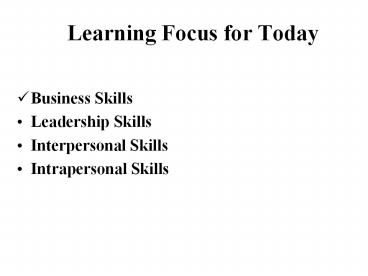Business Skills - PowerPoint PPT Presentation
Title:
Business Skills
Description:
Learning Focus for Today Business Skills Leadership Skills Interpersonal Skills Intrapersonal Skills Types of Business Skills Decision Making & Problem Solving ... – PowerPoint PPT presentation
Number of Views:188
Avg rating:3.0/5.0
Title: Business Skills
1
Learning Focus for Today
- Business Skills
- Leadership Skills
- Interpersonal Skills
- Intrapersonal Skills
2
Types of Business Skills
- Decision Making Problem Solving
- Argumentation, critical thinking
- Negotiation
- Planning
- Evaluating Performance
3
Teaching Method
Reading/Lecture Self Assessment Role Play
Thompson Leonardelli Rowan Conflict Style Ugli Orange Salary Negotiation
4
Factors affecting Negotiations
Type of Relationship between parties
Type of Emotions
Negotiation
Perceptions of Parties
Ability to Invent Options
Best Alternative to Negotiated Agreement BATNA
Bargaining Style
5
Negotiation
Ability to Invent Options
6
What is Inventing Multiple Options
- Students orally give examples of negotiation with
multiple Options - Car Sale Negotiation
- Salary Negotiation
- Union-Management Negotiation
- Expanding the pie or using multiple options leads
to win-win solutions
7
Factors affecting Ability to Invent Options
Fixed Pie Perceptions
Ability to Invent Options
Negotiation Outcome
Pre-mature judgments
Search for a single answer
8
Ability to invent options
Fixed pie perception
Negotiation Outcome
What is Fixed Pie?
- Erroneous belief that negotiators interests are
directly opposed gain for party A gt loss for
party B - E.g., married couple vacation plan (ski lodge or
luxury hotel)
9
Ability to invent options
Fixed pie perception
Negotiation Outcome
- Studies supporting the link
- When people believe that the gain made by one
party is a loss for the other party, they are
less likely to expand the pie - E.g., salary / car sales negotiation
10
Ability to invent options
Time pressure
Premature judgments
Studies supporting the link
- Premature judgmentscommit to a course of action
find it difficult to change that course even if
change could yield mutually beneficial outcomes - Time pressure increases premature judgments,
prevents use of new information
11
Ability to invent options
Search for single answer
Negotiation Outcome
- Studies supporting the link
- When negotiators translate their interests into
different constellations of offers where each
offer is equivalent to other offers, then they
are better able to conceive of different types of
outcomes that would be equally acceptable and
have improved outcomes
12
What affects the ability to invent options?
- Fixed pie perceptions
- Belief that gain for one is loss for other
results in poorer joint outcomes
- Time pressure
- Leads to commitment to a course of action or not
reacting to new information resulting in poor
outcomes
- Search for a single answer
- Having multiple equivalent offers results in
better outcomes
13
Whats next How BATNA affects Negotiation
Ability to Invent Options
Negotiation
Type of Best Alternative to Negotiated
Agreement BATNA
14
What are BATNAs
- BATNAbest alternative to negotiated agreement
- The alternative that negotiators can turn to if
no agreement is reached in negotiation - Students orally give examples of BATNAs in
- Car Sale Negotiation
- Salary Negotiation
- Union-Management Negotiation
15
Negotiation Outcome
Type of BATNA
Anchor point
Studies supporting the link Negotiators agree
to outcomes close to the value of their BATNAs
bec. BATNAs give an anchor point
16
Mid lecture point Three more factors affecting
negotiation
Type of Relationship between parties
Type of Emotions
Negotiation
Perceptions of Parties
17
Type of Relationship b/w parties
Negotiation Outcome
Negotiation Process
Studies supporting the link 1. Friends are less
competitive with each other than they are with
strangers 2. Friends are more willing to
compromise fail to invent options for mutual
gain than are strangers
18
Type of emotions
Negotiation Outcome
Negotiation Process
Studies supporting the link 1. Happy
negotiations are more cooperative identify
options for greater mutual gain 2. Negotiators
are less demanding and concede more with
opponents who are angry
19
Perceptions of negotiating parties
Negotiation Outcome
Negotiation Process
Studies supporting the link 1. Negotiators
perceive concessions made by opponents as
benefiting opponents and therefore devalue those
concessions
20
Perceptions of negotiating parties
Negotiation Outcome
Negotiation Process
Studies supporting the link 2. When
negotiators evaluate proposals not knowing that
opponents made those proposals, they are more
likely to perceive such proposals positively
21
How the three factors affect negotiation
- Type of Relationship between parties
- Friends are more conceding, less competitive,
often resulting in less optimal mutually
beneficial outcomes
- Type of Emotions
- Happy people are more cooperative and identify
mutually beneficial outcomes
- Perceptions of Parties
- People devalue offers proposed by the other
party
22
And finally. How bargaining style affects
negotiation
Type of Relationship between parties
Type of Emotions
Negotiation
Perceptions of Parties
Ability to Invent Options
Type of BATNA
Bargaining Style
23
Two Personality Dimensions affecting negotiation
Extraversion
Agreeableness
Negotiation Process Outcomes
24
What is extraversion agreeableness
- Extraversion
- talkativeness
- assertiveness
- positive affect
- Agreeableness
- cooperative
- generous
25
Extraversion Agreeableness
Negotiation Outcome
Negotiation Process
- Studies supporting the link
- Friendly, gregarious styles..
- Less likely to claim resources at table
- Were more susceptible to anchoring effects due to
other partys extreme first offers and therefore, - Obtained worse outcomes
26
Recap
Type of Relationship between parties
Type of Emotions
Negotiation
Perceptions of Parties
Ability to Invent Options
Type of BATNA
Bargaining Style
27
Whats next.
- Apply what you learned from reading/lecture
- Plan for Ugli-Orange Negotiation Exercise
- Critical thinking and argumentation via role
definition - Relevance for group decision making exercise
- Do Ugli-Orange Exercise
- Complete questionnaire on what happened in the
negotiation exercise - Group Discussion on learning from Exercise































